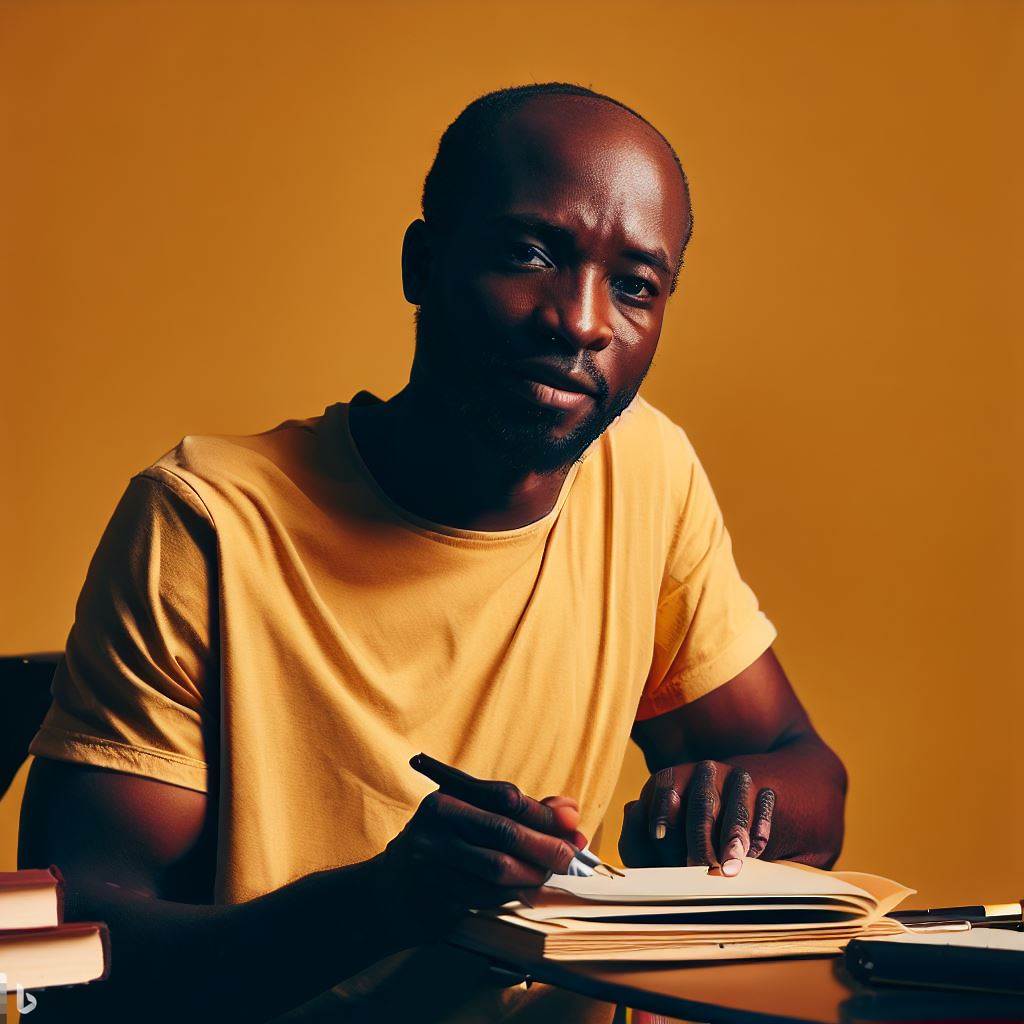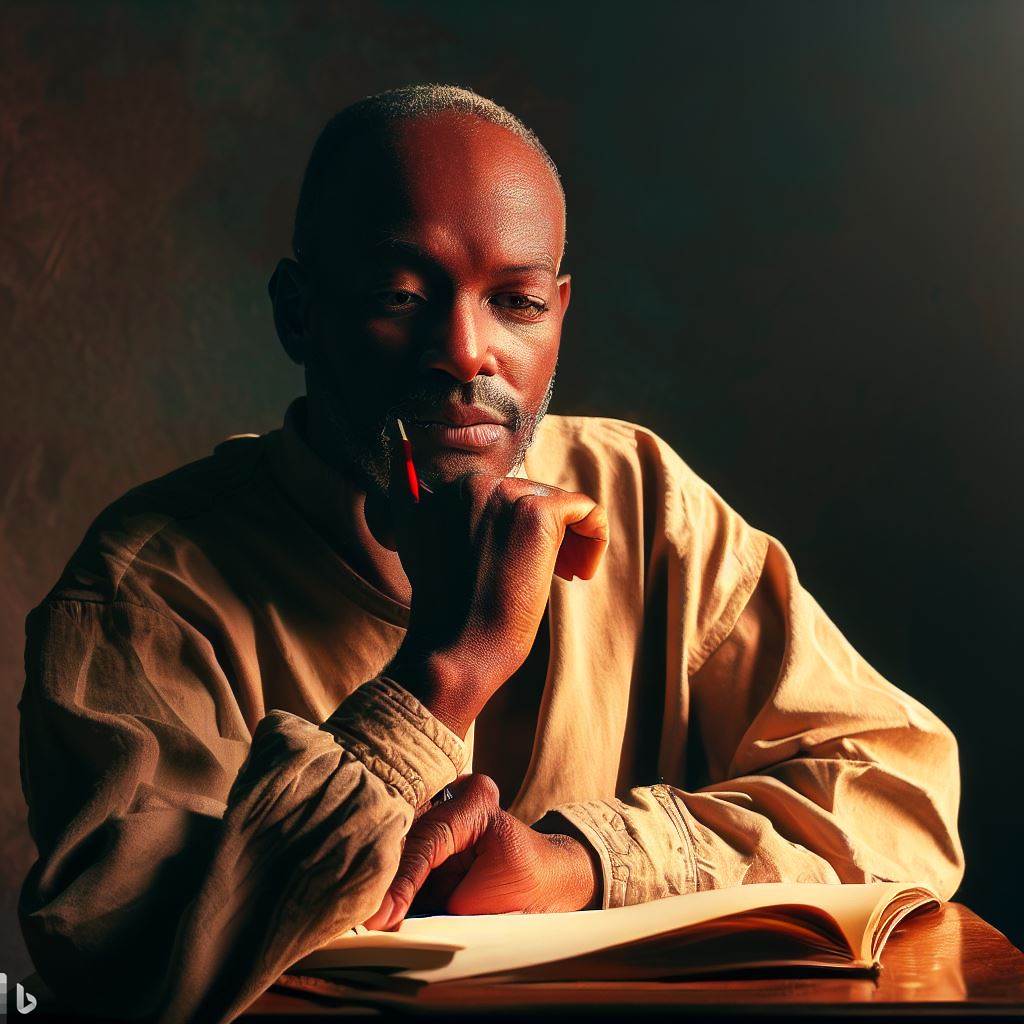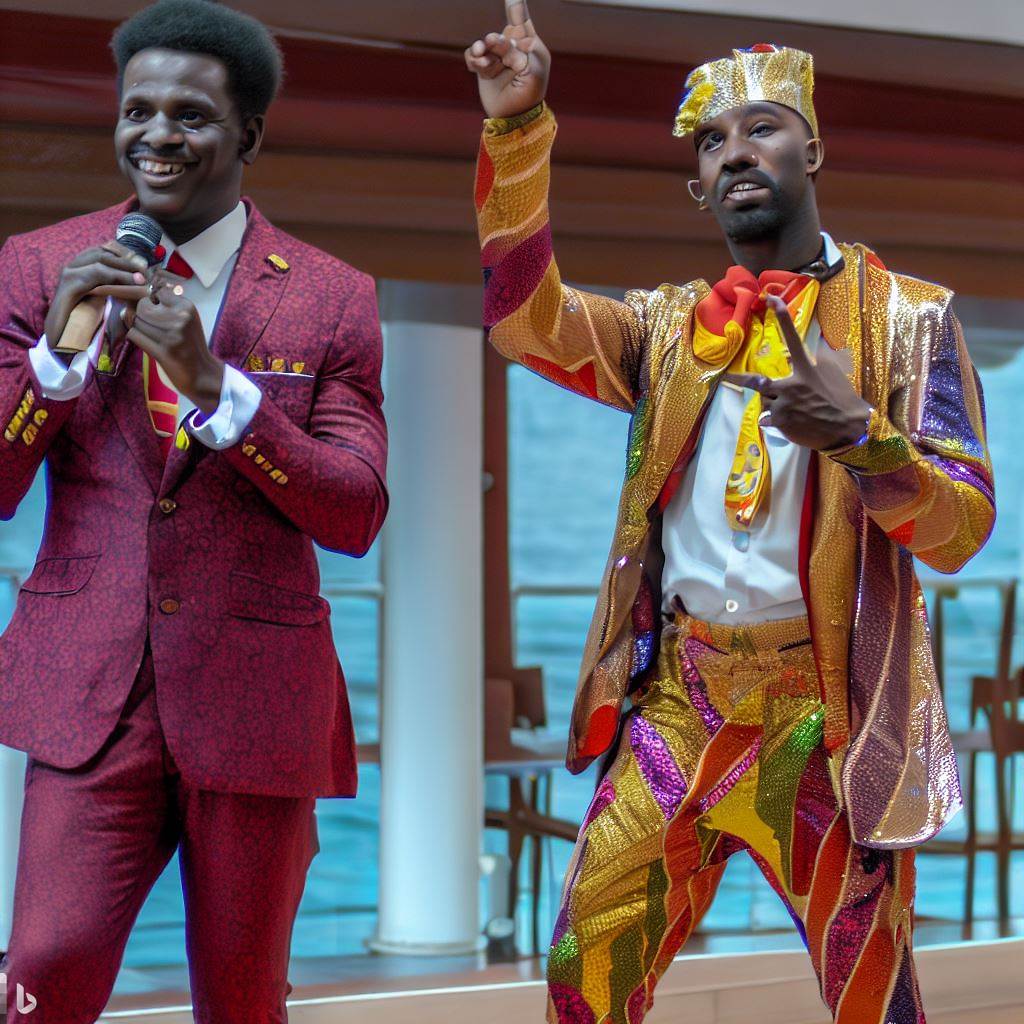Introduction
African literature has emerged as a powerful tool in portraying the diverse cultural experiences and perspectives of the continent.
These narratives, written by African writers, hold immense significance in shaping and preserving the African identity.
Brief Explanation of African Literature
African literature encompasses a wide range of written works, including novels, poetry, plays, and essays, produced by African authors.
It reflects the unique history, traditions, and challenges that African communities face.
Importance of African Voices in Telling Their Own Stories
The importance of African voices in portraying the continent’s stories cannot be overstated.
These writers have an intimate understanding of their communities, enabling them to offer authentic and nuanced narratives that challenge existing stereotypes.
Through their works, Nigerian writers, for instance, present the world with the cultural, social, and political complexities of their country.
They shed light on the struggles, triumphs, and aspirations of their people, contributing to a more accurate portrayal of Africa.
Furthermore, African writers help counter the dominant Western narrative about the continent.
By reclaiming their own narratives, they challenge preconceived notions and present a more diverse and multifaceted image of Africa.
Their storytelling also serves as a means of empowerment, instilling pride in African communities and inspiring future generations to share their own stories.
It encourages self-expression, cultural preservation, and a sense of belonging. In the end, African literature, specifically the works of Nigerian writers, plays a crucial role in telling Africa’s stories.
By amplifying African voices, these writers contribute to a more accurate and inclusive understanding of the continent, its people, and their rich cultural heritage.
Historical Overview of Nigerian Literature
Early Nigerian writers and their impact
- Amos Tutuola: Known for his novel “The Palm-Wine Drinkard” which blended oral tradition with fantastical elements.
- Chinua Achebe: Wrote “Things Fall Apart”, a groundbreaking novel that explored the impact of colonization on Nigerian society.
- Wole Soyinka: First African Nobel Laureate in Literature, known for plays like “Death and the King’s Horseman” showcasing Nigerian culture.
- Buchi Emecheta: Explored themes of gender inequality and cultural clash in works like “The Joys of Motherhood”.
The rise of Nigerian literature in the 20th century
- Independence: Nigeria gained independence from British colonial rule in 1960, fueling a desire for self-expression through literature.
- Literary Movements: Post-independence, Nigerian literature experienced a surge in creativity, influenced by the Negritude and African Writers’ movements.
- Publication Platforms: The establishment of publishing houses like Heinemann Educational Books and African Writers Series enhanced the visibility of Nigerian writers.
- Language Choice: Writers started using indigenous languages or Pidgin English to capture the Nigerian experience authentically.
Major contributors to Nigerian literature
- Chimamanda Ngozi Adichie: A contemporary voice, her novel “Half of a Yellow Sun” brought international recognition to Nigerian literature.
- Ben Okri: Known for his magical realism in “The Famished Road”, he won the Booker Prize in 1991.
- Helon Habila: His works like “Waiting for an Angel” tackled themes of political unrest and corruption.
- Adaobi Tricia Nwaubani: Addressed societal issues through works like “I Do Not Come to You by Chance”, highlighting the Nigerian scam culture.
In fact, Nigerian literature has a rich and diverse history, with early writers like Amos Tutuola and Chinua Achebe paving the way for future generations.
The 20th century witnessed a surge in Nigerian literature, fueled by independence, literary movements, and the establishment of publishing platforms.
Today, contemporary writers like Chimamanda Ngozi Adichie continue to make Nigerian literature vibrant and internationally recognized.
Read: Youth and Writing: A Look at Nigerian Millennials
Nigerian Writers and Their Influence
Chinua Achebe and his groundbreaking work
Nigerian writer Chinua Achebe revolutionized African literature with his masterpiece novel “Things Fall Apart.”
His novel explored the complexities of traditional African society colliding with the arrival of European colonialism.
Achebe’s vivid portrayal of Igbo culture and his nuanced characters earned him global recognition.
“Things Fall Apart” remains one of the most widely read African novels, highlighting Achebe’s significant influence.
Wole Soyinka’s influence on African theater
Wole Soyinka, a Nigerian playwright, became the first African to win the Nobel Prize in Literature in 1986. His plays, such as “Death and the King’s Horseman,” delved into cultural and political issues.
Soyinka’s works challenged social norms and served as a catalyst for change in African theater.
Through his thought-provoking and powerful plays, Soyinka established himself as a prominent voice in African literature.
Chimamanda Ngozi Adichie’s impact on contemporary literature
Chimamanda Ngozi Adichie, a Nigerian writer, gained international acclaim for her famous novel “Half of a Yellow Sun.”
Adichie’s literary prowess and ability to depict complex characters made her a literary sensation.
Her work explores themes of race, gender, and identity, shining a light on contemporary African experiences.
Adichie’s powerful storytelling and captivating narratives continue to inspire a new generation of African writers.
Other notable Nigerian writers and their contributions
Apart from Achebe, Soyinka, and Adichie, Nigeria boasts a plethora of talented writers who have contributed significantly to African literature.
Ben Okri, renowned for his novel “The Famished Road,” blends African folklore and magical realism to create profound narratives.
Helon Habila, in his novel “Oil on Water,” addresses the ecological and social issues surrounding Nigeria’s oil industry.
Teju Cole, through “Open City,” captures the complexities of identity and migration in a globalized world.
These Nigerian writers and many others continue to shape and enrich African literature with their unique voices.
In essence, Nigerian writers have played a pivotal role in telling Africa’s stories and shaping the literary landscape.
Through groundbreaking works like Achebe’s “Things Fall Apart,” Soyinka’s influential plays, Adichie’s contemporary narratives, and the contributions of other notable writers, Nigeria has emerged as a hub of literary talent.
Their stories, deeply rooted in African culture and experiences, have not only gained critical acclaim but also provided a platform for African voices to be heard worldwide.
These writers have inspired generations, amplifying the diverse narratives and shedding light on the rich tapestry of African literature.
Read: Understanding the Market for Nigerian Writers Abroad
African Stories in Nigerian Literature
Exploration of Nigerian myths and folklore in literature
Nigerian writers have played a crucial role in preserving and reimagining African stories in their literature.
They delve into the rich tapestry of Nigerian myths and folklore, bringing them to life through their vivid narratives.
Through their works, they showcase the fascinating and enchanting world of African traditional beliefs.
These writers skillfully intertwine the supernatural and the ordinary, incorporating mythical creatures, gods, and spirits into their stories.
By doing so, they provide a glimpse into the cultural fabric of Nigeria, celebrating its diverse traditions and beliefs.
Through the exploration of Nigerian myths and folklore, they not only entertain readers but also educate them about the country’s heritage.
Addressing colonialism and its effects on African societies
Nigerian literature also serves as a platform for addressing the complex and enduring effects of colonialism on African societies.
Many writers, like Chinua Achebe and Wole Soyinka, have emphasized the importance of reflecting upon the struggles faced by Africans during the era of colonization.
Through their works, they depict the harsh realities of colonization and its detrimental impact on the African continent.
By employing literary devices such as symbolism and allegory, Nigerian writers shed light on the social, political, and cultural consequences of colonial rule.
They challenge traditional narratives imposed by the colonizers and present alternative perspectives that promote African agency and resilience.
Through their literature, they encourage readers to critically examine the legacy of colonialism and work towards dismantling its lingering effects.
Emphasis on cultural heritage and traditions in storytelling
Nigerian literature is deeply rooted in cultural heritage, with writers placing great emphasis on preserving and showcasing African traditions.
They infuse their works with rituals, customs, and ceremonies, capturing the essence of Nigerian culture.
By incorporating these elements, they ensure that African traditions continue to thrive and are passed down to future generations.
Through their storytelling, Nigerian writers communicate the importance of cultural heritage in shaping individual and collective identities.
They celebrate the beauty and diversity of African cultures, challenging stereotypes and promoting cultural understanding.
By exploring the depths of cultural practices, they invite readers into a world rich in tradition and history.
Portrayal of post-colonial Africa in Nigerian literature
Nigerian literature also highlights the challenges faced by post-colonial Africa, providing a nuanced depiction of the continent’s complexities.
Writers delve into the sociopolitical landscape, exploring themes such as corruption, inequality, and the struggle for independence.
Their narratives capture both the aspirations and the disillusionment of post-colonial Africa.
Through their portrayals, Nigerian writers aim to stimulate dialogue about the issues faced by African nations, encouraging readers to actively engage in shaping a better future.
They challenge stereotypes and misconceptions by presenting a diverse range of characters and perspectives.
Through their literature, they empower Africans to embrace their history, confront their challenges, and strive for a brighter tomorrow.
In a nutshell, Nigerian writers have made invaluable contributions to African storytelling, exploring Nigerian myths and folklore, addressing colonialism’s impact, highlighting cultural heritage, and portraying post-colonial Africa.
Their literature serves as a powerful medium for preserving African traditions, challenging dominant narratives, and envisioning a more inclusive and vibrant future for the continent.
By delving into these stories, readers are transported to a world that is both deeply rooted in history and filled with infinite possibilities.
Read: Grants and Funding Opportunities for Nigerian Writers

Global Recognition of Nigerian Writers
Success and awards received by Nigerian writers
- Chinua Achebe: Renowned Nigerian writer Chinua Achebe’s novel “Things Fall Apart” has achieved global recognition and is considered a classic of world literature.
- Wole Soyinka: Soyinka became the first African Nobel laureate in Literature, gaining international acclaim for his plays and poetry.
- Chimamanda Ngozi Adichie: Adichie’s novel “Half of a Yellow Sun” earned her critical acclaim, numerous awards, and a spot on the international literary stage.
- Ben Okri: Okri’s novel “The Famished Road” won the prestigious Booker Prize, bringing him international recognition as a talented Nigerian writer.
International book deals and translations
- Nigerian writers have received book deals from renowned international publishers such as Penguin Random House and HarperCollins.
- The works of Nigerian writers have been translated into multiple languages, including French, Spanish, Chinese, and German, expanding their reach to a global audience.
- Translation of Nigerian literature allows for a cross-cultural exchange and enables readers worldwide to appreciate and understand the rich Nigerian storytelling tradition.
Nigerian literature festivals and their significance
- The Ake Arts and Book Festival, held annually in Nigeria, brings together local and international writers, publishers, and literary enthusiasts.
- The Lagos International Poetry Festival showcases Nigerian poets alongside international poets, promoting cultural exchange and appreciation of diverse poetic expressions.
- The Eko Poetry Slam is a popular event that celebrates spoken word poetry and provides a platform for Nigerian poets to gain recognition both locally and internationally.
- These literature festivals create opportunities for Nigerian writers to network, showcase their works, and collaborate with their global counterparts.
In general, the global recognition of Nigerian writers is evident through the success and awards received by prominent authors like Chinua Achebe, Wole Soyinka, and Chimamanda Ngozi Adichie.
Additionally, their works have garnered international book deals and translations, reaching a wider audience.
Nigerian literature festivals further contribute to this global recognition by showcasing the talent of Nigerian writers and facilitating cross-cultural exchange.
As Nigerian writers continue to tell Africa’s stories, their impact on the global literary landscape will only grow stronger.
Read: Impact of Nigerian Music Directors on the Global Scene
Challenges and Opportunities
Struggles faced by Nigerian writers
- Limited access to publishing opportunities due to a lack of established infrastructure.
- Financial constraints making it difficult to dedicate sufficient time and resources to writing.
- Limited visibility and recognition both within Nigeria and on the international literary scene.
- The challenge of balancing traditional Nigerian storytelling with Western literary expectations.
The role of technology in promoting African stories
- Online platforms and social media provide Nigerian writers with a wider audience and global reach.
- E-books and digital publishing offer cost-effective options for distribution and accessibility.
- Technology allows for the preservation of African oral traditions through audio and visual mediums.
- Online collaborations and virtual writing communities foster networking and shared learning.
Potential for collaboration among African writers
- Collaborative projects allow for the exchange of ideas, perspectives, and diverse storytelling techniques.
- Joint efforts amplify the collective voice of African writers, increasing visibility and impact.
- Collaborations can lead to innovative storytelling methods that challenge conventional narratives.
- Networking with fellow African writers opens doors to new publishing and promotional opportunities.
Increasing readership and market for Nigerian literature
- Encouraging a reading culture among Nigerians through literary events, book clubs, and educational programs.
- Developing partnerships between Nigerian writers and institutions to promote local literature.
- Engaging the Nigerian diaspora to support and spread awareness about Nigerian books and authors.
- Participating in international literary festivals to showcase Nigerian literature on a global platform.
In review, Nigerian writers face several struggles in bringing Africa’s stories to the forefront, including limited access to publishing opportunities and financial constraints.
However, technology has emerged as a powerful tool in promoting African stories, providing wider reach and collaboration possibilities.
By embracing collaboration, Nigerian writers can amplify their voices and expand their reach.
Additionally, efforts should be made to increase readership and create a market for Nigerian literature, both within the country and internationally.
Through collective action and utilization of available resources, Nigerian writers can overcome challenges and shape the future of African storytelling.
Conclusion
Recap of Nigerian writers’ contribution to African storytelling
Nigerian writers have made significant contributions to African storytelling, weaving together narratives that reflect the rich and diverse experiences of the continent.
Through their powerful prose, these writers have brought attention to crucial issues, creating a dialogue that resonates with readers worldwide.
The responsibility and potential of Nigerian writers to shape African narrative
Nigerian writers bear the responsibility of shaping African narrative, ensuring that it is dynamic, authentic, and inclusive.
They have the potential to challenge stereotypes, amplify marginalized voices, and reshape the global perception of the continent.
Their words have the power to inspire change and create a sense of unity among Africans.
Encouragement for readers to explore Nigerian literature and support African storytelling efforts
It is imperative for readers to explore the vast landscape of Nigerian literature and engage with the diverse narratives it offers.
By supporting and promoting African storytelling efforts, readers can amplify the voices of Nigerian writers and contribute to the preservation and celebration of African culture.
Through this collective effort, we can build a more vibrant, inclusive, and accurate portrayal of Africa and its people.
Nigerian writers are at the forefront of telling Africa’s stories, providing a lens through which the world can better understand the continent’s complexities.
With their unique perspectives, they have the power to reshape narratives and foster a greater appreciation for the diverse voices and cultures that make up Africa.
It is our collective responsibility to support and celebrate Nigerian literature, ensuring that African storytelling continues to flourish and captivate audiences worldwide.




